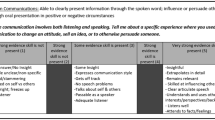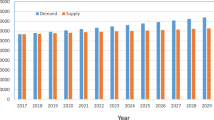Abstract
Background
The factors that influence interest among medical students toward different medical specialties with time are important. The potential impact of changes in work-hour rules on orthopaedic applications in comparison to that of primary care medicine has not been reported. The change in number of applicants to general surgery during this period also is unknown.
Questions/purposes
The goals of our study were to assess the changes in orthopaedic applications relative to the 80-hour workweek and to compare these changes with those in the primary care field. We also documented the change in applications to general surgery after the work-hour changes.
Methods
A retrospective analysis of data from the National Resident Matching Program, San Francisco Matching Programs, and the American Urological Association from 1997 to 2010 was performed. Two cohorts of medical school applicants to primary care and surgery were established: those who applied from 1997 to 2002, predating work-hour changes, and those who applied from 2005 to 2010, after implementation of the 80-hour regulation. From the surgical data, applications to orthopaedic and general surgery were subselected and analyzed. Data were analyzed from a total applicant pool of 111,973 representing primary care and surgery applications. There were 59,996 and 51,977 applicants before and after the work-hour changes, respectively.
Results
Applications to orthopaedics increased by 21% (3310 to 4011 applicants) after implementation of work-hour changes, whereas primary care applications decreased by 18% (42,587 to 34,884 applicants) after the work-hour rules. General surgery applications decreased by 24% during this period.
Conclusions
Residency applications to orthopaedic surgery have increased since inception of the 80-hour workweek. By contrast, applications to primary care programs and general surgery have decreased after implementation of work-hour restrictions.


Similar content being viewed by others
References
American Urological Association. Residency Match 2013. Available at: http://www.auanet.org/content/residency/residency-match.cfm#statistics. Accessed August 9, 2012.
Arnold MW, Patterson AF, Tang AS. Has implementation of the 80-hour work week made a career in surgery more appealing to medical students? Am J Surg. 2005;189:129–133.
Bakaeen FG. The 80-hour work week and interest in surgery. J Surg Res. 2011;165:49–51.
Baldwin K, Namdari S, Donegan D, Kamath AF, Mehta S. Early effects of resident work-hour restrictions on patient safety: a systematic review and plea for improved studies. J Bone Joint Surg Am. 2011;93:e5.
Baskies MA, Ruchelsman DE, Capeci CM, Zuckerman JD, Egol KA. Operative experience in an orthopaedic surgery residency program: the effect of work-hour restrictions. J Bone Joint Surg Am. 2008;90:924–927.
Bernstein J, MacCourt DC, Jacob DM, Mehta S. Utilizing information technology to mitigate the handoff risks caused by resident work hour restrictions. Clin Orthop Relat Res. 2010;468:2627–2632.
Froelich J, Milbrandt JC, Allan DG. Impact of the 80-hour workweek on surgical exposure and national in-training examination scores in an orthopedic residency program. J Surg Educ. 2009;66:85–88.
Iglehart JK. Health reform, primary care, and graduate medical education. N Engl J Med. 2010;363:584–590.
Kaplan LJ, Maerz LL, Schuster K, Lui F, Johnson D, Roesler D, Luckianow G, Davis KA. Uncovering system errors using a rapid response team: cross-coverage caught in the crossfire. J Trauma. 2009;67:173–178; discussion 178–179.
Kusuma SK, Mehta S, Sirkin M, Yates AJ, Miclau T, Templeton KJ, Friedlaender GE. Measuring the attitudes and impact of the eighty-hour workweek rules on orthopaedic surgery residents. J Bone Joint Surg Am. 2007;89:679–685.
Lockley SW, Cronin JW, Evans EE, Cade BE, Lee CJ, Landrigan CP, Rothschild JM, Katz JT, Lilly CM, Stone PH, Aeschbach D, Czeisler CA; Harvard Work Hours, Health and Safety Group. Effect of reducing interns’ weekly work hours on sleep and attentional failures. N Engl J Med. 2004;351:1829–1837.
Morrissey S, Dumire R, Bost J, Gregory JS. Feasibility of and barriers to continuity of care in US general surgery residencies with an 80-hour duty week. Am J Surg. 2011;201:310–313; discussion 313–314.
National Resident Match Program. NRMP Historical Reports. Available at: http://www.nrmp.org/data/historicalreports.html#mainmatch. Accessed August 7, 2012.
Peabody T. The effect of work hour restrictions on the education of orthopaedic surgery residents. Clin Orthop Relat Res. 2006;449:128–133.
San Francisco Matching Programs. SF Match Residency and Fellowship Matching Services. Available at: http://www.sfmatch.org/. Accessed August 7, 2012.
Steinbrook R. The debate over residents’ work hours. N Engl J Med. 2002;347:1296–1302.
Woo B. Primary care: the best job in medicine? N Engl J Med. 2006;355:864–866.
Zarebczan B, Rajamanickam V, Lewis B, Leverson G, Sippel RS. The impact of the 80-hour work week on student interest in a surgical career. J Surg Res. 2011;171:422–426.
Zuckerman JD, Kubiak EN, Immerman I, Dicesare P. The early effects of code 405 work rules on attitudes of orthopaedic residents and attending surgeons. J Bone Joint Surg Am. 2005;87:903–908.
Author information
Authors and Affiliations
Corresponding author
Additional information
Each author certifies that he or she, or a member of his or her immediate family, has no funding or commercial associations (eg, consultancies, stock ownership, equity interest, patent/licensing arrangements, etc) that might pose a conflict of interest in connection with the submitted article.
All ICMJE Conflict of Interest Forms for authors and Clinical Orthopaedics and Related Research editors and board members are on file with the publication and can be viewed on request.
This work was performed at University of Pennsylvania Medical Center, Philadelphia, PA.
About this article
Cite this article
Anakwenze, O.A., Kancherla, V., Baldwin, K. et al. Orthopaedic Residency Applications Increase After Implementation of 80-hour Workweek. Clin Orthop Relat Res 471, 1720–1724 (2013). https://doi.org/10.1007/s11999-013-2785-1
Received:
Accepted:
Published:
Issue Date:
DOI: https://doi.org/10.1007/s11999-013-2785-1




